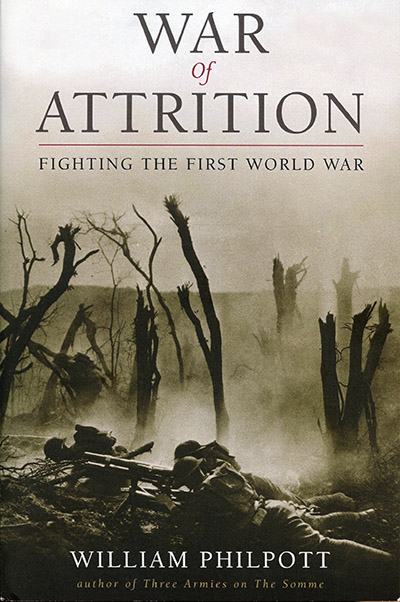
War of Attrition
Fighting the First World War
by William Philpott. 349 pages.
Overlook Press, 2014. $32.50.
Reviewed by Doug Stewart
In the 100 years since World War I erupted, its ghastly carnage has been blamed on an out-of-control arms race, a tangle of alliances, and feckless and inept leaders. “Events passed very largely outside the scope of conscious choice,” wrote Winston Churchill in The World Crisis, 1911–1918. On both sides, the belligerents “swayed and staggered forward in helpless violence.”
In his fast-moving, richly detailed history of the war, War of Attrition, William Philpott puts forth a contrarian view. A professor of the history of warfare at King’s College, London, Philpott describes the strategy of attrition adopted by both sides after offensive operations bogged down in 1915 as a “rational” choice—indeed, the only possible route to victory. He allows that a “casualty-conscious” observer, then as now, would view attrition as a senseless and cruel way to fight a war. “Yet the gradual, systematic destruction of the enemy’s military capability proved both necessary and effective when huge armies backed by industrialized empires took the field.”
Philpott, author of Three Armies on the Somme: The First Battle of the Twentieth Century (2009), shows how military commanders only gradually realized that planning for decisive, winner-take-all battles and territorial conquest was increasingly pointless. All that mattered was killing enemy soldiers—in large numbers and quickly.
Americans are accustomed to the story of American troops arriving in France in 1917 and 1918 to tip the balance in favor of the Allies once and for all. Philpott argues that Britain and France, with a little help from Italy, would have won the war without American troops, whom he characterizes as mainly “greenhorn” reserves (though he acknowledges that some 114,000 doughboys never made it home).
The author draws on a wealth of unusual, sometimes unpublished sources, among them one from a German cavalry officer, who wrote scornfully of his superiors’ trench-warfare strategy before confessing: “War is a strange business. No one really knows it.”
Doug Stewart is a Massachusetts-based freelance writer who wrote about the First World War’s transatlantic “bridge of ships” in the Winter 2014 MHQ.

.jpg)



